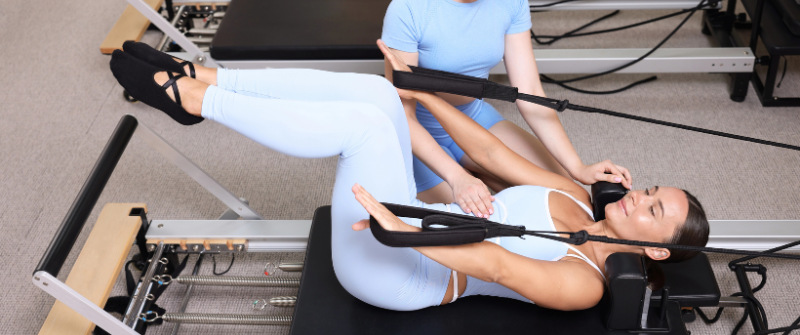
- by NEXO Team
- September 27, 2024
Running a functional fitness studio has its challenges, like dealing with potential client injuries, preventing equipment damage, and more. For studio owners to safeguard themselves and their businesses against these risks, it’s incredibly important to have functional fitness studio insurance.
However, with so many myths surrounding insurance coverage in the fitness industry, some owners find it challenging to properly assess and fully understand their options. To make it easier for fitness center owners to secure the coverage they need, NEXO, the industry’s leading insurance broker, dispels some of the most common myths about functional fitness studio insurance.
Also Read: Mastering Functional Fitness: Essential Benefits And Strategies For A Healthier You
Common Myths About Functional Fitness Studio Insurance
Myth 1: General Liability Insurance Covers Everything
Fact: General liability insurance has coverage limitations. While having general liability insurance is important, it doesn't cover all risks. It typically excludes professional negligence, equipment damage, and employee injuries. Studio owners need to understand all of these limitations to make sure they’re getting comprehensive coverage.
Myth 2: Only Large Studios Need Comprehensive Insurance
Fact: Risks are universal. The size of the studio doesn't matter when it comes to risk, as small studios face the same potential for accidents, injuries, and lawsuits as larger facilities. Functional fitness studio insurance is necessary for studios of all sizes to protect them against unexpected losses.
Myth 3: Property Insurance Is Enough to Protect My Business
Fact: Multiple policies are often needed. Property insurance protects your physical assets, but it doesn't protect you from liability claims or business interruptions. A well-rounded insurance portfolio often includes multiple policies to help you address several different risks.
Myth 4: Personal Trainer Certification Provides Sufficient Coverage
Fact: Individual certification doesn’t replace business insurance. While certification may offer some personal liability protection, it's not a substitute for comprehensive business insurance. Studio-wide protection requires dedicated policies tailored to your specific business needs.
Myth 5: Client Waivers Eliminate the Need for Insurance
Fact: Waivers provide limited legal protection. Waivers might help reduce liability, but they're not bulletproof. Courts still hold studios accountable in certain situations. Insurance is always needed to protect your business from potential legal and financial repercussions.
Also Read: General Liability Versus Professional Liability Insurance: What Is The Difference?
Important Facts About Insurance for Functional Fitness Studios
Fact 1: Professional Liability Insurance Is Crucial
Professional liability insurance is a must-have for functional fitness studios. This type of coverage protects owners against claims related to coaching errors, omissions, and professional negligence. In the field of functional fitness, where complex movements are the norm, the risk of coaching-related claims is higher than in traditional gyms. This insurance protects a business if a client alleges that the training program or professional advice led to an injury or other damages.
Fact 2: Workers' Compensation Insurance Is Often Required
Many regions legally require fitness studios to have workers' compensation insurance for their employees, including their trainers and other staff. This insurance covers medical expenses and lost wages for employees who are injured on the job, which is important to have in a physically demanding environment like a functional fitness studio.
By providing this coverage, studio owners comply with legal requirements while also demonstrating their commitment to their team's well-being. It helps them attract and retain quality staff since they know they're protected in case of work-related injuries or illnesses.
Fact 3: Business Interruption Insurance Can Save Your Studio
Business interruption insurance acts as a lifeline for fitness studios that are facing unforeseen closures due to events like natural disasters, pandemics, or major equipment failures. This coverage helps them replace lost income during periods when the studio isn’t able to operate normally, so they can continue paying bills, salaries, and other expenses.
By maintaining financial stability during closure or rebuilding periods, this insurance helps studios deal with unexpected surprises and come back completely ready to serve their clients.
Fact 4: Regular Policy Reviews Are Essential
As a fitness studio grows and evolves, its insurance needs do as well. Regular policy reviews allow insurance coverage to keep up with business changes like offering new services, expanding to new locations, or growing the client base. These reviews help identify gaps in coverage that could leave the business vulnerable otherwise.
Staying on top of functional fitness studio insurance needs also helps studios remain compliant with legal requirements and industry standards. When owners regularly assess and update their functional fitness insurance coverage, they make sure their studio is always sufficiently protected against current and upcoming risks.
How to Choose the Right Insurance Policies for Your Functional Fitness Studio
Assessing Studio-Specific Risks
In order to choose the right functional fitness studio insurance, start by evaluating the unique aspects of your studio. Think about the types of activities you offer, the equipment you use, and your client demographics. Are you focused on high-intensity workouts, Olympic weightlifting, or a mix of disciplines? Do you cater to athletes, general fitness enthusiasts, or complete beginners? By understanding the different risk factors that are specific to your needs, you’ll determine which types of coverage make the most sense for your business.
Working with an Experienced Insurance Broker
Partnering with an insurance broker who truly understands the fitness industry is invaluable for functional fitness studio owners, as these professionals provide guidance tailored to your business’s needs. They help studio owners understand all of their functional fitness studio insurance options, comparing policies from different providers to find the best coverage at competitive rates. Leveraging their expertise helps studio owners save time and potentially money.
At NEXO, we specialize in insurance solutions for fitness facilities. Not only do we offer comprehensive coverage, but we also manage your insurance, allowing you to focus on running your gym while enjoying peace of mind.
Also Read: Understanding Workers' Compensation Insurance for Functional Fitness Facilities
Customizing Policies to Fit Your Needs
Once you’ve identified your risks and found a knowledgeable broker, it’s time to focus on customizing your policies. Your functional fitness insurance coverage should be tailored to the specific needs of your studio so that you’re not over-insured in some areas and under protected in others. Studio owners should consider bundling different types of insurance, like general liability, professional liability, and property insurance, as doing so often provides broader coverage at a better rate.
Conclusion
If you’re a functional fitness studio owner, understanding the facts of insurance is one of the most important aspects of protecting your business. When you know how to recognize common myths and acknowledge the importance of comprehensive coverage, you’re better equipped to take steps that safeguard your studio against risks.
For trusted insurance solutions that are tailored to fitness facilities, reach out to us at NEXO. With our expertise in insuring over 20,000 fitness professionals nationwide, we help studio owners find affordable, comprehensive functional fitness studio insurance. Contact us today to learn more.
Categories
Fill out a short form to contact us with your questions or to receive a customized quote.
Recent Posts
-
 Injury Waivers Aren’t Enough: Insurance Gaps Jiu-Jitsu Owners Overlook
January 21, 2026
Injury Waivers Aren’t Enough: Insurance Gaps Jiu-Jitsu Owners Overlook
January 21, 2026 -
 How Gym Risk Management Can Lead to Lower Premiums Over Time
January 21, 2026
How Gym Risk Management Can Lead to Lower Premiums Over Time
January 21, 2026 -
 Why Combat Sports Gyms Pay More for Insurance and How to Control Costs
January 21, 2026
Why Combat Sports Gyms Pay More for Insurance and How to Control Costs
January 21, 2026 -
 Functional Fitness Injury Trends That Impact Insurance Underwriting
January 21, 2026
Functional Fitness Injury Trends That Impact Insurance Underwriting
January 21, 2026 -
 Why Pilates Studios Face Unexpected Liability Despite Being Low-Impact
January 21, 2026
Why Pilates Studios Face Unexpected Liability Despite Being Low-Impact
January 21, 2026
